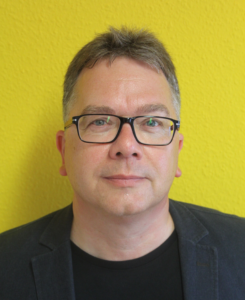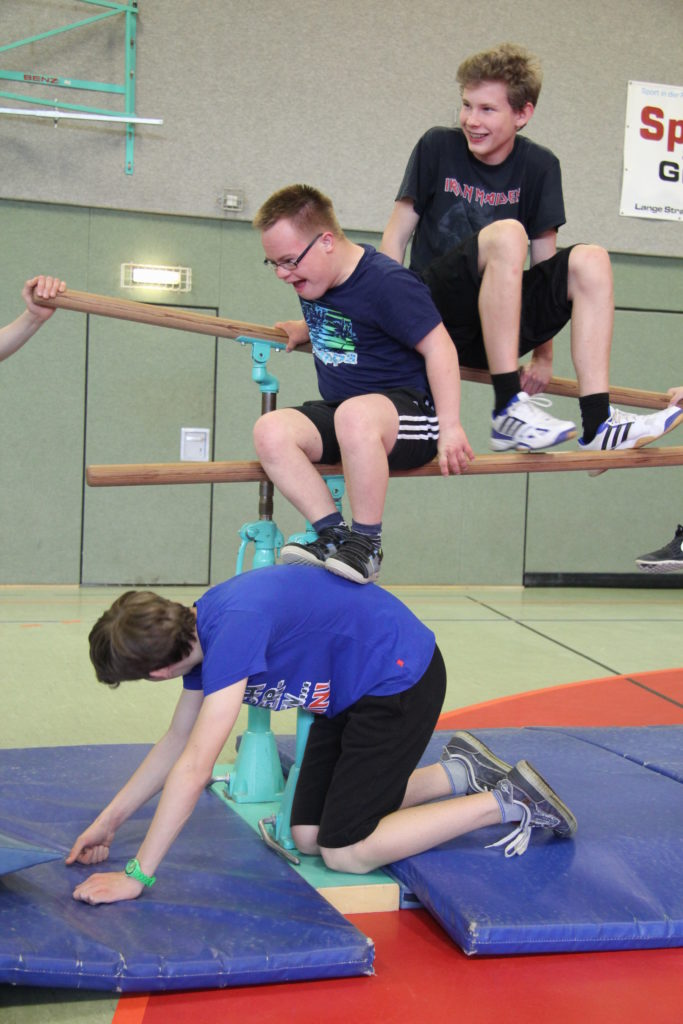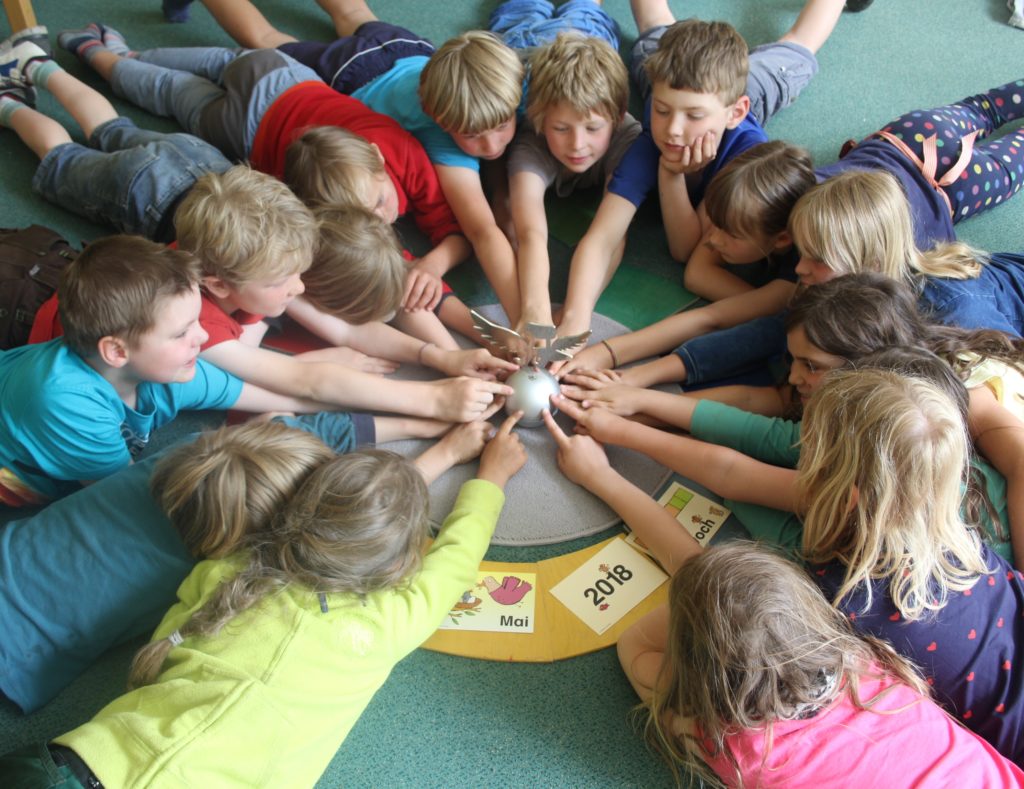570 pupils, almost half of them with special educational needs, learn together at the “Protestant school complex ‘Martinschule’” in Greifswald (Germany). Inclusion starts at elementary school level, and all students graduate: be it with an internal school-leaving certificate, a middle school exam or a university entrance qualification. The Martinschule wants to be a school for everyone – and its success proves the concept right: in 2018, it received the main prize of the “German School Award”.
How can inclusive education work? That’s the theme of Inclusion Europe’s campaign “That’s what I learned”. We spoke to Benjamin Skladny, headmaster of the Martinschule since its beginnings.
You can also read the interview in German.

What were the beginnings of the Martinschule?
Before the fall of the Iron Curtain, pupils with an intellectual disability had no opportunity to go to school in East Germany – they were considered “unable to attend school”. In addition, they were divided into two categories: They were either “not capable enough for being supported”, then they were accommodated in institutions for people with disabilities, psychiatric hospitals and sometimes even in old people’s homes; or the parents had to look after them at home and therefore were unable to pursue any professional activity. Or they were considered “capable enough for being supported”, then they could visit a day care center if there was one in the area.
After reunification, in the area of the former GDR (“German Democratic Republic”), there was the possibility to build schools for pupils with intellectual disabilities. This is how the day care centre in Greifswald became the Martinschule.
Since then, as a trained special education teacher, I have been the headmaster of the Martinschule.
Where did the students and teaching staff come from in the beginning?
Initially, the 24 children and adolescents at the daycare center became pupils, and trained teachers joined the employees who had previously looked after them. Later, another 60 pupils came from Greifswald and the surrounding area. In the school year 1992/93 there were more than 80 pupils. At Easter 1993 we moved into a new building in the middle of town. This location was deliberately chosen because we did not want to be on the outskirts of the city, but right there where social life takes place – so the students could meet other people, use the shopping facilities, practice traffic education in a real environment …
Initially, inclusion at the Martinschule started with a cooperation between a class of a state elementary school and a class of the Martinschule …
Indeed. The opening up of the Martinschule, which I had aimed for from the beginning, was initially rejected by the parents, who were happy to finally be able to bring their children to their “own” school. They did not want any contacts with other schools and teachers, due to the many negative experiences most of them had had in previous years, when they had been rejected, laughed at and excluded because of their disabled children. So we took our time here …
After a long period of preparation, the time had finally come in the school year 2000/01: a middle school class with 8 students with a “Focus on Special Educational Needs” started learning in cooperation with a primary school class. Unfortunately, the project could not be continued beyond primary school because there was no secondary school in Greifswald that wanted to include our class.
That‘s why we founded our own primary school in 2002/03: the “Protestant school complex ‘Martinschule’”. From this year onwards, there were always two classes, so-called “twin” classes, where children with and without intellectual disabilities learned together. In the school year 2006/07 we established an inclusive comprehensive school including a high school. In the following years, the twin class system continued until the 12th school year. In 2014, the first high school graduates left the Martinschule.
From 2011 onwards – starting with first grade – all classes became “fully inclusive”. This means that there were no more separate classes with children with intellectual disabilities. Since then there have been at least three and a maximum of four students with intellectual disabilities in each elementary school class. Creating this small peer group is important for the self-confidence and self-esteem of students with disabilities.

What is special about teaching at the Martinschule?
We do not have lessons which last 45 minutes, we offer a lot of interdisciplinary projects and workshops and many possibilities for self-study, which gives students the opportunity to learn at their own pace, according to their needs. There are individual learning goals for all students, which are discussed and defined in regular goal-setting talks (together with the parents and the teachers). Since the Martinschule has been a full-time day school from the start, there is basically no homework to do. Marks are only given from the 9th grade onwards (when students are 14-15 years old).
Each of our 12 primary school classes is led by a primary or a special education teacher, supported by pedagogical assistants and, if necessary, also assistants for integration. In addition, there is advice available from special education teachers, and we closely cooperate with occupational therapists, physiotherapists and speech therapists working at the school, as well as with representatives of the government offices for youth welfare, social assistance and health.
When students are 10-11 years old, they form a total of five core groups (with a maximum of 11 students each) in which they set their own individual learning goals and tasks for the day, which they report upon at the end of the day. Students can learn autonomously at their own rhythm – this enables cooperation, despite their very different talents and abilities.
At the age of 13-14, students continue their individualized learning, whereas at age 15-17, they part ways: some start preparing for the middle school exams, others for the exams for their university entrance qualification. Students with intellectual disabilities complete practical training in three different areas:
– our own student company “Nibbles & Co”, which among other things prepares and sells breakfast for our elementary school students
– a four-room apartment rented by us in which they practice independent living and which serves as a starting point for exploring Greifswald and the surrounding area
– a graduation centre where students can complete internships tailored to their needs
But at school events and also partly during compulsory optional subjects, students with and without intellectual disabilities meet each other.

Why are you convinced of your concept?
Because it works!
At our school, students do not have to adapt to rigid patterns, with the school bell or class schedule pushing them on. They can learn individually, and thereby, much more intensely. This benefits everyone – also the (school) community, not just the children with intellectual disabilities. For many years, our students have been performing above-average in comparative tests, as well as the middle school exams and the exams for university entrance qualification.
Even in the upper grades, the pupils like to come to school, and our teachers and parents are very committed.
We receive a lot of positive feedback from visitors to the school, students and lecturers who work with us in their teacher training programmes, as well as our interns.
What has changed for you since the Martinschule received the German School Award in 2018?
The award is of course a great recognition of our work. Additionally, it is an incentive for us to continue and to develop individualised learning in the senior classes as well. This approach has been met with little approval from many – a lot of teachers have left in the past school year, parents and students were (and still are) sceptical, and there have been heated discussions. But winning the German School Award was in a way the kick-off for this development, and actually, it has turned out really good so far.
We see inclusion at our school as something that is constantly evolving. One thing is for sure: Inclusion has no limits, the limits are only in our heads!
Take part in our campaign “#ThatsWhatILearned” on the topic of inclusive education! What did you learn in school, in your family, in life?
Let us know! All material is also available in easy-to-read.
Don’t forget to register for our conference “Europe in Action” in Vienna, Austria (27-29 May)! We will talk about “Quality education for all”.





